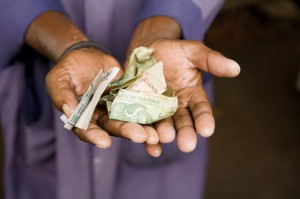Adaptation Fund
Imminent funding shortfall despite good work: don’t forget the Adaptation Fund!
The 24th meeting of the Adaptation Fund (AF) board concluded in Bonn, Germany, on Friday, October 10th 2014. The fund’s 32 Board Members once again convened to decide on topics such as the funding of new, concrete adaptation projects and programs in developing countries that are particularly vulnerable to the impacts of climate change.
The meeting was unusual in one respect: For the first time in the history of the fund, no projects were submitted through the usual multilateral institutions on behalf of the countries. Instead, 12 of the 13 project applications for this meeting were submitted by developing countries that will use their own national institutions to implement projects and programs on the ground and bear the responsibility for their proper implementation. Six of these new projects were approved by the Board. Since the official launch of the fund in 2010, only five other projects have successfully made use of the direct access.
This development shows that the Adaptation Fund is doing an excellent job – not only because its projects (current total: 41) address the needs of developing countries and give affected populations a voice, but also because as a direct access pioneer, it promotes the development of required resources, strengthens national institutions and enhances international cooperation of the relevant authorities in the affected countries. The AF has thus helped to shift the need for climate change adaptation measures from a local to a national focus, where they can be taken into account in the design of national development strategies.
Funding is a prerequisite for action
Rarely has the AF received as much attention as at the UN Climate Summit in Warsaw last year, when the industrialized countries earmarked additional financial resources in the closing stages of the conference, allowing the AF to reach its fundraising goal of $100 million. The attention ebbed again just as quickly in the wake of the conference, however. Since Warsaw, things have been rather quiet around the AF, which must now secure new pledges for the coming years in the shadow of the Green Climate Fund (GCF) that is gradually becoming functional.
We are far from being able to speak of a lasting rescue of the fund at this stage. Even after the Warsaw pledges, it has not been possible to fund all of the projects by multilateral institutions, as their funding volume is limited to 50% of the AF’s total resources to ensure adequate funding for direct access. In some cases, projects have been waiting for funding for more than a year. These include two projects in the world’s most vulnerable countries that do not have suitable institutions for using the direct access and therefore must rely on the support of multilateral institutions to implement them. The funds still available for direct access will also be abruptly diminished following the project grants of the 24th meeting of the AF Board. For a long time, donor countries argued that the AF still had sufficient funds in its direct access window (the other 50% of the AF’s total financial resources) that could not be put to use due to a lack of eligible project applications. The ongoing work of the AF, which launched its own readiness program in 2014 to assist developing countries – both in accrediting national institutions for direct access and in developing high-quality project proposals – has gradually robbed such claims of any substance.
The financial position of the AF therefore remains precarious. Revenue from the proceeds of carbon credits remain negligible due to the inadequate climate protection targets of the Kyoto member states, and so financial pledges from governments remain necessary to guarantee the functioning of the Adaptation Fund. In view of the pending capitalization of the GCF and the attention that will thus be focused on the new multilateral fund, the AF would appear to have no hope of reaching its $80 million fundraising goal for this year. But at this particular point – at which the AF has further successes to its credit while the GCF is still far from funding concrete adaptation projects – the international community must ensure that the AF can continue its vital work beyond 2014.
Germany’s support once again required
Germany, which hosts the AF headquarters in Bonn, is now once again being asked to underscore its previous commitment and support for the fund. Already in Warsaw, Germany moved ahead with a pledge of €30 million, without which the fundraising goal for 2013 would certainly have been missed. This has made Germany the fund’s largest donor, together with Spain and Sweden.
Hopes for further funding have been dimmed by the German government’s pledge to contribute €750 million to the GCF, but the past has shown that Germany is aware of the AF’s good work. It may therefore be a good sign that Germany is once again present on the AF Board since the 24th meeting.
Continue reading: Germanwatch briefing
David Eckstein, Germanwatch





